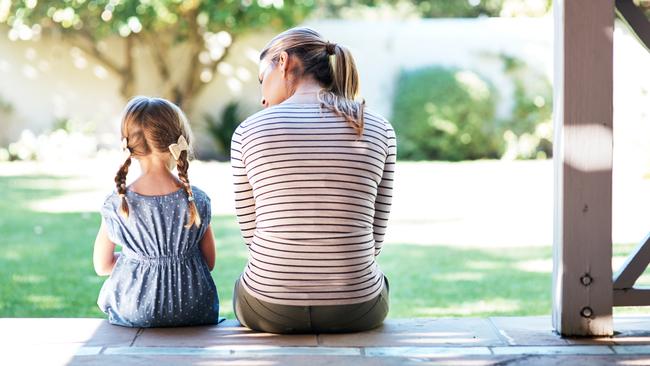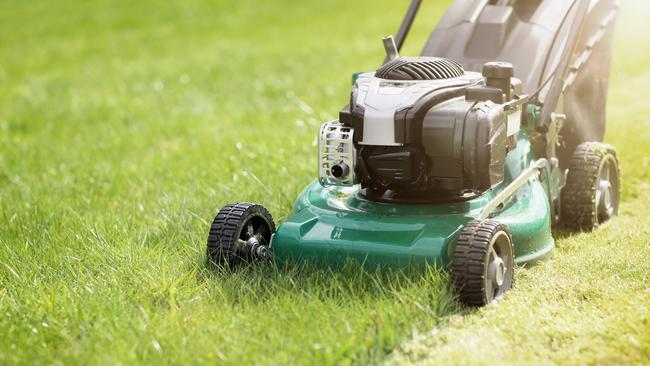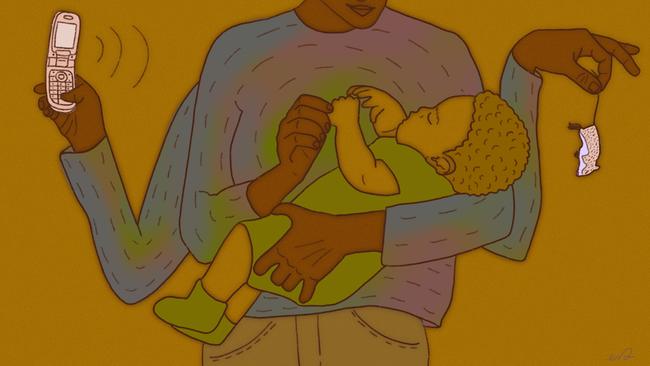
While my husband was incapacitated I realised there are some gender stereotypes I’m sticking to; some kinds of work I’m happy to leave to the men. You will never find me crawling around in the roof removing rotting vermin. And I cannot bring myself to get near enough to a snake to kill it. The kids, the dogs and I hide in the house while I dial the number of the nearest bloke. And I’m not even a little bit sad about never mowing the lawn.
My concern is that there is a level of hypocrisy in attempts to get men to engage more in domestic labour and care work if I am not willing to engage more in stereotypically male tasks such as vermin control.
My husband is a very engaged dad and has readily turned his hand to care and domestic work as it has been required of him. Why shouldn’t I do the same for him? Is refusing to lay rat baits the female equivalent of a man who refuses to change a nappy?
Maybe this is only really an ideological conundrum for country folk who are presented with unique and often very physical labour requirements. It could be that there are simply more jobs on the farm that women have difficulty engaging in. Perhaps urban life is carried out in more gender-neutral settings.

I know I am being a princess about the rat bait but spearing a venomous reptile with a shovel really is beyond my capability. I simply cannot deconstruct a lawnmower or a dishwasher.
I have felt like I’m not being true to the cause of equality and women’s liberation by getting comfortable in certain gender stereotypes, but completely arbitrary labour division with total disregard for biology or personal preference doesn’t seem like a great solution either. I’m not setting the rat baits because I know that equality is not achieved by women being the same as men, it’s achieved by women being appropriately valued and respected for their unique contribution.
Don’t get me wrong, I know plenty of women who show no fear when it comes to deadly reptiles and men who run for the hills. Plenty of women who can fix a fence or lead a school or conduct a boardroom meeting.
People will always exist outside gender stereotypes at times but they also will exist largely within them simply because gender stereotypes have developed across millions of years of evolutionary adaptation, resulting in different biochemistry and physiology of men and women.
Culture, socialisation and necessity will continue frequently to move us out of our biological confines, and we should be free to do so, but we also should have the mobility to do the work that is stereotypical.
The problem is that the biological role of birthing, feeding and caring for babies, along with domestic labour, the work that becomes the female stereotype, also happens to be quite disadvantageous in modern times.
The problem is not that I won’t set a mouse trap and tokenly perform male duties, it’s that most of my work is often done for free. The problem is that at this time in my life I am not trading my important unpaid work for paid work.

I also think gender-neutral division of labour is a silly idea because I have body parts that my husband lacks and that clearly predispose me to infant care. It made sense for me to feed the babies given I had a built-in feeding apparatus. I also was exposed to a cocktail of hormones for nine months that made me especially keen to keep the babies alive once they were born.
As a result I inadvertently have become specialised in the care of babies and young children. My husband also has developed his baby care and household cleaning skills. He is a better cook than I will ever be but his care hours will never approach mine because he has a full-time job and he doesn’t have boobs or birth hormones.
But rather than support women in their unique labour, we have opted for a clear strategy of supplanting their vital unpaid contribution with gainful employment, whether they like it or not. We steadily have replaced unpaid care work with institutionalised care settings regardless of the consequences. We simply have ignored the biology and people seem more stressed than ever.
I think there is a better way to stop women being incredibly financially and civically disadvantaged by contributing vital unpaid care and domestic labour.
The only way to give women genuine choice and truly to value them as equals is to compensate them better financially for their contribution.
There are policies to this end already in place around the world but the political will is lacking in Australia. People seem to struggle with the idea of compensating women for their unpaid labour.
Care work is so undervalued and invisible that women in unpaid care work are often framed as an underused resource. We don’t compensate this unpaid labour because we don’t consider it worthy of support. We subsidise childcare, on the other hand, because we think women are much more valuable in their paid contribution. Our taxpayer spending patterns clearly reflect our cultural values and belief systems.
We also must address cultural and systemic factors that prevent men and women having full mobility to engage or disengage in care work. Men, and increasingly women, often are locked into full-time paid work and lack the choice to engage in more care work even if they want to.
Care work often is framed still as a threat to masculinity even though most women will tell you there is nothing hotter than a man holding a baby while driving a vacuum cleaner. I don’t know if the same is true when women mow the lawn but I sure don’t feel sexy dry heaving when I throw a mouse trap outside.
It’s even becoming less socially acceptable for women to contribute time to child rearing as those who do are seen as lacking ambition, a little bit backward or simple minded. They also frequently are dismissed as wealthy when in reality most single-income families have made huge sacrifices such as having fewer children or delaying buying a home.
We can continue focusing on equal workforce participation and gender-neutral labour division as the foremost measures of equality where any woman who is not in full-time paid work is personally responsible for slowing progress on gender equality. Or we can start genuinely recognising the female contribution in all its glory.
If all labour is valued appropriately it matters less which way you cut it. In saying that, we do have a lot to gain from men being more involved in the care of their children, especially in the early years.
We also have a lot to gain from women being involved in politics, economies and public life, but how we participate and divide labour has to be a choice, otherwise it’s just a new set of chains.






I have never set a mouse trap. When my husband was recovering from surgery I refused to take on his job of baiting for rats even though infestations can get out of hand very quickly in our neck of the woods. Give me a kid with gastro any day but I’m not going near rodents, dead or alive.